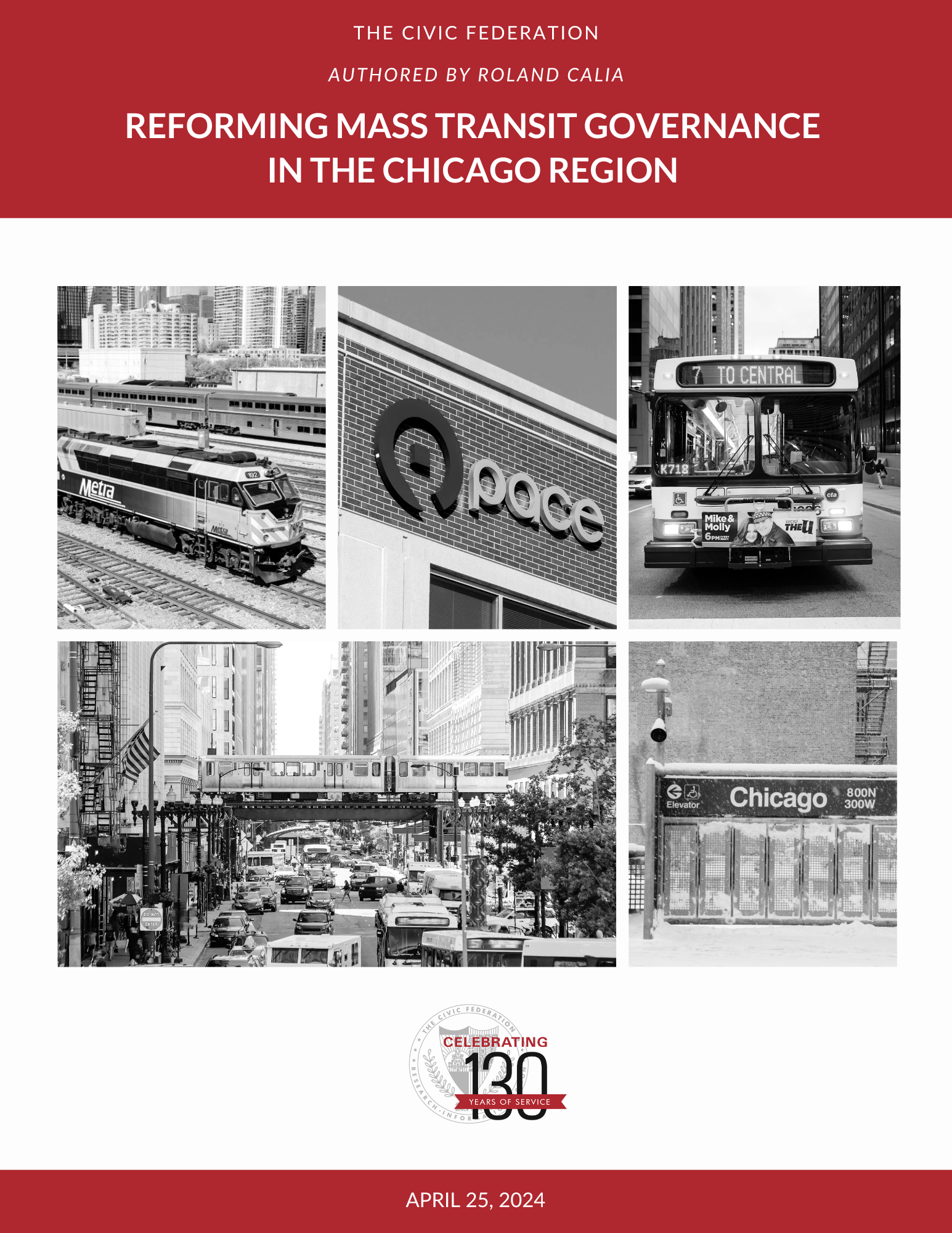April 25, 2024
UPDATE: Legislation sponsored by State Senator Ram Villivalam and Representative Eva-Dina Delgado to consolidate the Regional Transportation Authority and its three service boards into a new Metropolitan Mobility Authority was introduced on April 29, 2024. As discussed in our report, the Civic Federation supports consolidation of the Chicago Transit Authority, Metra, Pace and the Regional Transportation Authority and we are pleased to see legislation introduced that would accomplish this goal. The Federation will be analyzing the details of the proposed bill and providing further updates about our position on this and related proposals.
Executive Summary
Northeastern Illinois’ mass transit agencies—CTA, Metra and Pace, which are overseen by the Regional Transportation Authority (RTA)—face a looming fiscal crisis. The transit agencies face an estimated $730 million deficit beginning in 2026 after federal pandemic relief funds are depleted. This represents approximately 20% of the system’s operating budget and will continue to grow unless it is addressed. The revenue decline is largely due to reductions in farebox revenue as ridership has failed to return to pre-COVID 19 pandemic levels. Ridership is projected to increase to 349 million trips in 2024, but this is just 62% of the ridership level of 562 million in 2019.
The current state of mass transit in Illinois impels a change to the governance structure that oversees the delivery of public transit services in the Chicago metropolitan region to improve service delivery and efficiency. Additional funding from the State of Illinois will be critical to resolving the crisis, but financial support must be linked with structural reforms that would provide a more centralized, efficient governance system that focuses on regional challenges and leverages regional opportunities. A more efficiently run regional transit system is also essential to creating pathways to opportunity and advancing equity goals for historically disinvested and disadvantaged communities.
The Civic Federation calls on Governor Pritzker, the Illinois General Assembly, the RTA and the service boards to take this once-in-a-generation opportunity to fully restructure its major mass regional transit system. Providing additional funding without first reforming the governance structure of the transit agencies would only lead to the continuation of flawed, inefficient transit services.
As a solution, the Civic Federation supports the integration of the three transit agencies with the Regional Transportation Authority into a single regional transit agency. This was one of two governance reform options presented in the Plan of Action for Regional Transit (PART), released in December 2023 by the Chicago Metropolitan Agency for Planning (CMAP), the official regional transportation and land use planning agency for the seven counties of northeastern Illinois. It was produced in response to the Illinois General Assembly calling on CMAP to develop recommendations for solutions to the fiscal crisis and operational and governance challenges facing the region’s mass transit agencies.
In addition to identifying funding options, the PART report presented several options for governance reform, recognizing the critical connection between how transit agencies are governed and transit system outcomes. Two of the proposed options would create true structural and operational reform: 1) consolidation of the transit service boards into a centralized regional transit agency; and 2) maintaining the service boards to manage day to day operations, service decisions and local planning efforts, to be overseen by a regional coordinating agency that would develop region-wide policies, allocate funding and coordinate mobility planning. Both options would grant significantly greater power and authority to the Regional Transportation Authority (RTA), the existing government agency created by the State of Illinois to coordinate the operations of Chicago’s multiple transit providers, than it currently holds. However, the Civic Federation regards one of those two options —consolidation—as a comprehensive solution capable of addressing many of the existing operational inefficiencies while also solving for the calcified cultures, politics and bureaucratic competition dragging down our troubled system.
The two transit governance reform options recommended in the PART report would grant significantly greater power and authority to the transit oversight agency than the current RTA possesses. They would both require significant legislative changes to the existing RTA and Metropolitan Transit Authority Acts, which would be politically challenging. Both options, but centralization especially, would lead to a more effective utilization of transit resources, greater service coordination and improved customer service. The advantages of improved operational efficiency on a regional basis, rather than the current limited parochial basis, would outweigh the costs.
This report outlines existing obstacles faced by the Regional Transportation Authority and the benefits and challenges associated with each of the two reform options described in the PART report. In this moment of looming fiscal crisis and operational deficiency within our mass transit systems, the Civic Federation urges seizing the opportunity for true transformation and adopting centralized transit governance reform.

